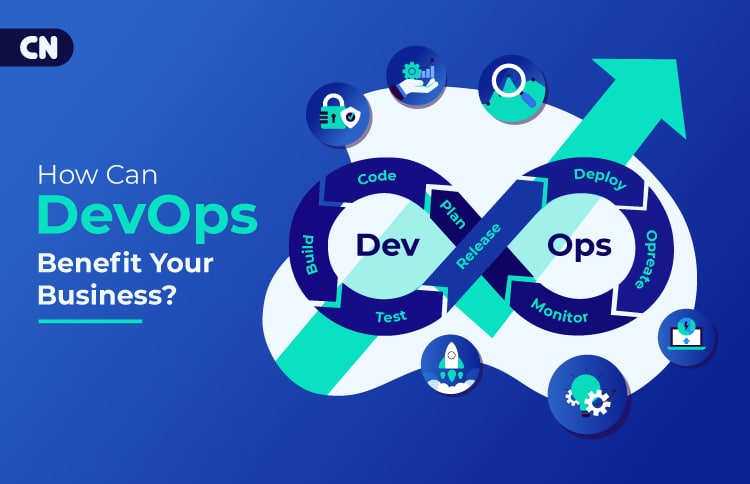How Can DevOps Benefit Your Business?
Table of Contents
According to Statista, DevOps implementation had increased from 8% to 10% in 2017. IDC has recently stated that the DevOps software market is likely to grow from $2.9 Billion in 2017 to $6.6 Billion in 2022. Experts around the world feel that DevOps is going to reach the peak of its popularity and become mainstream soon.
Legacy organizations have already started adopting DevOps because of the business value it brings forth. Even for startups, DevOps is gradually becoming the number one practice.
With the implementation of DevOps, most companies around the world can:
- Manage the collaborative efforts across multiple departments within an organization
- Step up the standards of productivity
- Optimize development tasks
- Decrease errors
- Meet niche requirements
World-renowned companies like Adobe, Facebook, Etsy, Netflix, Walmart, and Amazon have implemented DevOps into their ecosystem.
The holistic approach that DevOps brings has led the tech giants to adopt it to shape their organization’s goals.
At the heart of DevOps principles, there lies the idea of collaborative relationships and learning between development and operations. And this is why most companies globally have started introducing DevOps strategies in their IT environment.
To give you a better idea, we’ve put forth a detailed description of DevOps below that will help you take a closer look at it:
DevOps – Explained!
DevOps is an approach where operations and development teams work together to test, build, monitor, and deploy web applications ensuring quality, speed, and control.
DevOps is a mindset. It’s about collaborating and delivering to accomplish a common goal. This involves collectively improving every aspect of a product and acting as quickly as possible to make specific enhancements.
Development and operations teams, under a DevOps model, are not “siloed.” When these two teams get integrated into a single team, the productivity of the developers and the efficiency of the operations automatically improve.
Often, the QA and the security teams also collaborate with the development and operations teams to step-up product quality. When security becomes the focus under a DevOps model, it is referred to as a DevSecOps team. These teams use best practices and tech stacks that help applications evolve reliably and rapidly.
How Does a DevOps Engineer Add Value?
A DevOps engineer usually comes with a strong penchant to code and script, handle deployment, and manage infrastructure automation. Let’s delve deep into how a DevOps engineer adds business value:
- A DevOps engineer comes with a deep understanding of automation tools to facilitate a quick deployment process. An ability to accurately deal with automation is what differentiates a DevOps engineer from others.
- He writes top-notch and secure code for apps that keeps unwanted and illegal access at bay.
- The ability of a DevOps engineer to communicate and interact with fellow workers across departments speeds up the app development process.
- By implementing a customer-focused approach, a DevOps engineer helps organizations foster a culture that perfectly caters to the needs of the target audience. He helps businesses create a roadmap for designing products that go beyond mere customer satisfaction.
- App testing is a crucial part of the software development process. A DevOps engineer helps in conducting end-to-end testing to ensure each application functions flawlessly even at peak load times.
How Businesses Benefit from DevOps?
- Improved Customer Service Capabilities: Recent studies show that over 70% of businesses worldwide have reported improvements in customer service after implementing DevOps programs.
- Increased Reliability: DevOps model includes practices like continuous integration and continuous delivery. This paves the way for quality and reliable app updates that ensure positive user experience.
- Enhanced Security: By using automated compliance policies, configuration management techniques, and fine-grained controls, under a DevOps model, engineers can improve security and track compliance at scale.
- Quicker Deployment: Businesses can deploy new systems, applications, and processes rapidly using DevOps strategies. This helps businesses drive growth and ROI at cost-effective rates.
- Team Morale Gets a Boost: With the help of DevOps, businesses can improve communication and collaboration. Clear communication within departments improves workflow, productivity, and employee morale.
- More Scope for Innovation: DevOps helps business leaders eliminate unnecessary workload, modernize techniques, and organize tasks. This gives the project leaders and department heads ample scope to brainstorm and innovate.
How Can Businesses Adopt DevOps?
To deliver quicker and more reliable updates to customers, businesses can adopt the following DevOps practices:
- Continuous Integration: Through continuous integration, engineers continuously merge code updates into a central repository and then run automated tests. This improves software quality, eliminates bugs, and reduces time-to-market.
- Continuous Delivery: Through continuous delivery, developers build, test, and prepare a product for its final release. This practice helps developers have a deployment-ready build artifact.
- Microservices Architecture: This is a service-based architectural style that helps arrange a single app as a collection of loosely coupled services. Businesses use this distinct method to build single-function modules by using multiple frameworks and interfaces, to increase app scalability and flexibility.
- Logging and Monitoring: It is important for businesses to monitor metrics and understand how infrastructure and application performance affects the experiences of their customers. Monitoring and logging lets organizations know about how updates and changes in applications impact end-users.
To Summarize
DevOps is a methodology that paves the way for uninterrupted coordination between QA experts, developers, and other specialists, for product creation and timely release.
The implementation of DevOps helps both legacy businesses and startups create and upgrade software products seamlessly and effortlessly.
If you’re looking to gain a competitive edge using DevOps solutions, contact our experts today.
We’ll help fine-tune your business approach in a way that allows you to reach new milestones without costing a fortune.


 Web Development
Web Development Cloud Engineering
Cloud Engineering Mobile App Development
Mobile App Development AI/ML/GenAI
AI/ML/GenAI E-commerce
E-commerce Software Development
Software Development UI/UX
UI/UX QA
QA Dedicated Teams
Dedicated Teams











